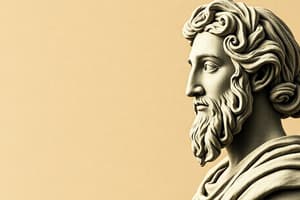Podcast
Questions and Answers
Which philosopher emphasized the importance of knowing oneself and questioning everything?
Which philosopher emphasized the importance of knowing oneself and questioning everything?
- Plato
- Aristotle
- St. Augustine of Hippo
- Socrates (correct)
According to Plato, what are the three main sources of human behavior?
According to Plato, what are the three main sources of human behavior?
- Habit, passion, and society
- Desire, emotion, and knowledge (correct)
- Nature, nurture, and chance
- Reason, emotion, and environment
What concept does Aristotle contribute to the understanding of human actions?
What concept does Aristotle contribute to the understanding of human actions?
- Seven causes of human actions (correct)
- Natural philosophy as a method of knowledge
- The tripartite soul theory
- The dualism of body and soul
What does Aristotle claim is the central purpose of human life?
What does Aristotle claim is the central purpose of human life?
What is the philosophical view of the self described in the content?
What is the philosophical view of the self described in the content?
Which philosopher argued that only the pursuit of goodness brings happiness?
Which philosopher argued that only the pursuit of goodness brings happiness?
What does dualism refer to in the context of Plato's philosophy?
What does dualism refer to in the context of Plato's philosophy?
What metaphor does St. Augustine of Hippo use to describe truth?
What metaphor does St. Augustine of Hippo use to describe truth?
What statement reflects Rene Descartes' view on existence?
What statement reflects Rene Descartes' view on existence?
Which philosopher is associated with the idea that personal identity is grounded in consciousness?
Which philosopher is associated with the idea that personal identity is grounded in consciousness?
What concept did David Hume reject?
What concept did David Hume reject?
How does Immanuel Kant differentiate aspects of self?
How does Immanuel Kant differentiate aspects of self?
What does Gilbert Ryle's statement, 'I made it, and so I am,' imply?
What does Gilbert Ryle's statement, 'I made it, and so I am,' imply?
According to the content, what is inherent in the philosophy of man emphasized by the early Christian figure?
According to the content, what is inherent in the philosophy of man emphasized by the early Christian figure?
Which philosopher is noted for the phrase, 'A wise man proportions his belief to the evidence'?
Which philosopher is noted for the phrase, 'A wise man proportions his belief to the evidence'?
In what way does Locke's concept of 'tabula rasa' influence his view on personal identity?
In what way does Locke's concept of 'tabula rasa' influence his view on personal identity?
Study Notes
Philosophical Foundations of the Self
- Philosophy, derived from Greek "philosophia," means "love of wisdom" and addresses fundamental questions about existence and knowledge.
- Understanding the self involves inquiry into its fundamental nature, a topic explored by ancient Greeks to contemporary thinkers.
- The self is dynamic and ever-evolving, requiring individuals to actively discover their identities.
Socratic Contributions
- Socrates emphasized self-knowledge with "Know thyself" and believed questioning leads to personal insight.
- Advocated that true wisdom lies in recognizing one's ignorance.
- Highlighted the pursuit of goodness as essential for happiness.
Platonic Concepts
- Plato identified three sources influencing human behavior: desire, emotion, and knowledge.
- Proposed dualism, asserting humans consist of both body and soul.
- Introduced the Tripartite Soul:
- Reason (ruling class) aims for rational decision-making.
- Spirit (military class) seeks honor.
- Appetite (commoner) craves physical pleasures.
Aristotelian Ideas
- Aristotle identified seven causes of human actions: chance, nature, compulsions, habit, reason, passion, and desire.
- Advocated natural philosophy as a means of gaining knowledge, laying the groundwork for scientific thinking.
- Defined happiness as a key purpose of human life, attainable through virtue.
St. Augustine's Philosophy
- St. Augustine integrated Greek philosophy with Christian teachings, asserting that God is the ultimate truth.
- Promoted the idea of loving God correlating with loving fellow humans, reflecting the golden rule: "Do unto others as you want them to do unto you."
Descartes' Rationalism
- René Descartes, the father of modern philosophy, stated, "I think therefore I am," emphasizing self-awareness as foundational to the self.
- Proposed that true knowledge arises from personal reasoning, distancing the self from traditional authorities.
John Locke's Identity
- John Locke suggested personal identity stems from psychological continuity, grounded in consciousness.
- Proposed the notion of a "tabula rasa" (blank slate) mind shaped by experiences and reflections over time.
Hume's Impressionism
- David Hume rejected the idea of a continuous personal identity, suggesting that what we call "self" is merely a collection of impressions and experiences.
- Advocated that belief should align with evidence.
Kant's Consciousness
- Immanuel Kant posited that "To be is to do," emphasizing consciousness as central to understanding the self.
- Differentiated between:
- Internal Self: psychological states and decisions.
- External Self: the physical world and object representation.
Gilbert Ryle's Behaviorism
- Ryle argued against separating mental states from physical states, suggesting human behavior can be fully explained through bodily operations.
- Believed that understanding human behavior requires considering the actions of the body without reference to mental processes.
Studying That Suits You
Use AI to generate personalized quizzes and flashcards to suit your learning preferences.
Related Documents
Description
Explore the philosophical concepts surrounding the nature of the self, from ancient Greek thinkers like Socrates and Plato to modern interpretations. This quiz delves into self-knowledge, the Tripartite Soul, and the dynamic essence of identity. Enhance your understanding of how philosophical inquiry shapes our sense of self.




